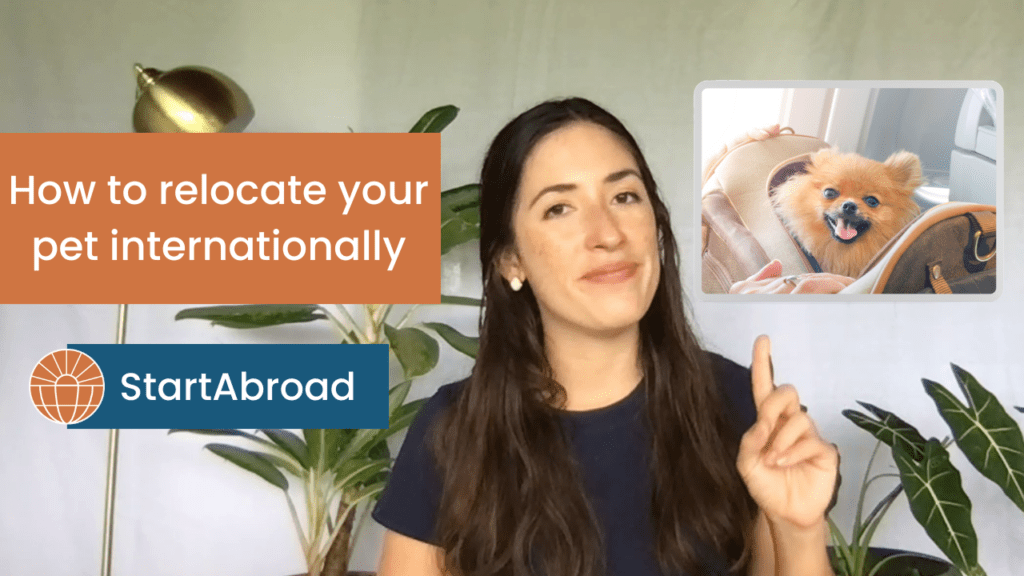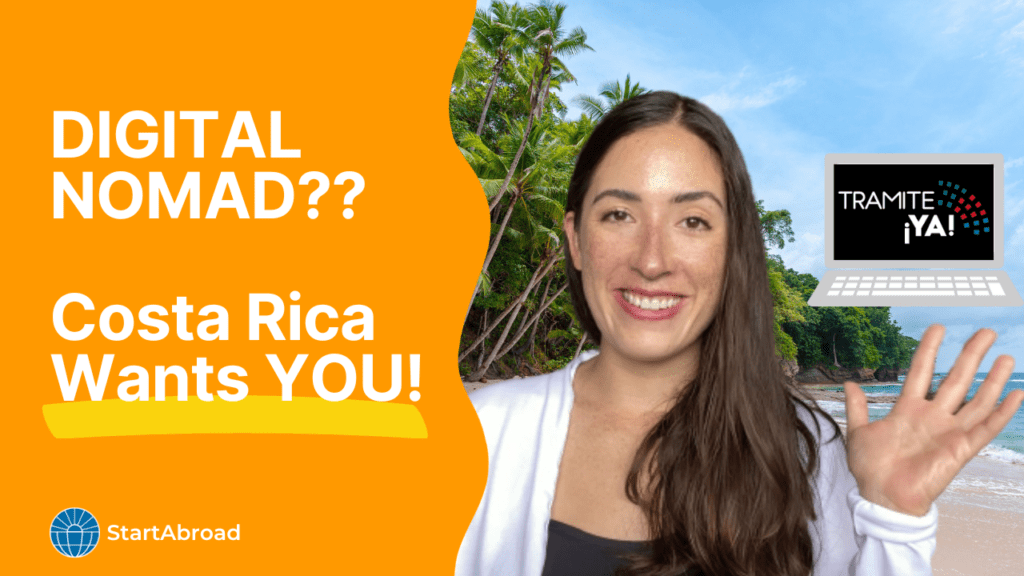Costa Rica visa options
Costa Rica Country Guide
Everything you need to know about moving to Costa Rica
Exploring visa, residency, and citizenship options for expats moving to Costa Rica
Costa Rica offers a number of attractive visa options for expats
Costa Rica has a diverse range of attractive visa options for Americans and Canadians to take advantage of. In this section of the Costa Rica Country Guide, we will comprehensively explore Costa Rica’s visa, residency, and citizenship routes that could be open to you.
Navigate page
Overview of visa options in Costa Rica
The eight primary visa options in Costa Rica cater to diverse circumstances:
Digital Nomad Visa – Ideal for remote workers or online business owners with a monthly income of $3,000 or more.
Residency for Retired Individuals (Pensionado) – Tailored for retirees receiving a minimum of $1,000 per month in retirement income.
Residency for Fixed Income Recipients (Rentista) – Available to those with a steady income of at least $2,500 per month or $30,000 per year over two years.
Residency for Investors (Inversionista) – Suitable for those investing at least $150,000 in a business or assets like real estate.
Residency through Marriage – A viable option for foreign nationals marrying a Costa Rican citizen after two years.
Residency for Parents – Offered to foreign nationals whose children are born in Costa Rica.
Residency for Self-Employed Individuals or Entrepreneurs – Tailored for those aspiring to be self-employed or open their own business in Costa Rica; proof of business ownership is required.
Residency for Foreign Workers – Accessible to foreign employees hired by companies conducting business in Costa Rica, whether they are foreign or domestic.
Of these, the Digital Nomad Visa, the Pensionado, the Rentista, and the Inversionista are the most common for expats. In this guide, we will explore in depth those visas. If you have questions about any of the other residency routes, please reach out to us at [email protected].
Visas versus routes to residency
Some Costa Rica visas offer pathways to residency and citizenship, while others do not.
Visas like the Pensionado, Rentista, and Inversionista are considered Temporary Residencies. This has several implications, the most important of which are:
- After three years, an expat with a Temporary Residency can apply for Permanent Residency
- After seven years as a resident, Permanent Residents can apply for Costa Rican citizenship and receive a second passport
- A Temporary Resident must pay into the CAJA, or Costa Rican social security system
- At the same time, a Temporary Resident gains access to CAJA, the public health care system
The Tourist Visa is not a route to permanent residency or citizenship. Nor is the Digital Nomad Visa. Neither the Tourist Visa or the Digital Nomad Visa can be switched to a temporary residency.
Costa Rica's Tourist Visa
Affordable but limited
What is Costa Rica’s Tourist Visa?
Costa Rica’s Tourist Visa is one of the most popular ways for expats to explore the country. The Tourist Visa allows foreign nationals from many countries to visit for up to 90 (and more recently, 180 days) without needing a visa in advance. There are two requirements for this visa that foreign nationals must be aware of:
- a passport that is valid for at least six months beyond the planned departure date
- evidence of a return or onward ticket during the term of the Tourist Visa
How long can an expat stay in Costa Rica with a tourist visa?
This depends on the nationality of the expat. There is more information on this below, but Americans and Canadians typically are allowed to stay in Costa Rica for between 90-180 days. It is important to note that the number of days allotted is entirely up to the discretion of the specific processing Immigration agent. These agents are not legally required to give an entrant the maximum 180 days.
Applicants can extend the length of their tourist visas, however this can be an expensive and lengthy process.
Country categories for Costa Rica’s Tourist Visa
The requirements for Costa Rica’s Tourist Visa, as well as the length of stay allowed, depends on the passport of the foreign national visiting Costa Rica. Costa Rica groups countries into four categories.
- Category 1: Can freely enter on the Tourist Visa, and can stay up to 90-180 calendar days.
- Category 2: Can freely enter on the Tourist Visa and stay for up to 30 days.
- Category 3: Requires a consular visa before entering Costa Rica, is only allowed a single entry, and will only be allowed to stay for a maximum of 60 days.
- Category 4: Requires a restricted visa before entering Costa Rica, is only allowed a single entry, and will only be allowed to stay for a maximum of 60 days.
Foreign nationals from Categories 2 and 3 that have established, valid work permits or residencies from Category 1 countries may be able to forego some of the additional requirements of their respective categories.
Below is a non-exhaustive list of countries in each category. If you have questions about a country that is not included in the list below, please reach out to [email protected] for more information.
Category 1
- The United States
- Canada
- Japan
- The UK
- The Netherlands
- France
- Spain
- Greece
- Germany
- Brazil
- Argentina
- Israel
- Barbados
- United Arab Emirates
- Australia
- New Zealand
- And more…
Category 2
- Belize
- Bolivia
- Kazakhstan
- Dominica
- Guatemala
- Ukraine
- Turkey
- Taiwan
- And more…
Category 3
- Saudi Arabia
- Ecuador
- Indonesia
- India
- Ghana
- Jordan
- Nigeria
- Pakistan
- China
- Thailand
- Vietnam
- And more…
Category 4
- Ethiopia
- Jamaica
- Iran
- Iraq
- Bangladesh
- Haiti
- And more…
Costa Rica's Digital Nomad Visa
Accessible, short-term option for solo professionals and families
What is Costa Rica’s Digital Nomad Visa?
Costa Rica’s Digital Nomad Visa is designed to be simpler, faster, and more affordable to get over the Temporary Residency visas. The basic requirement of the Digital Nomad Visa is that an applicant has made more than $3000 (or $4000 if applying on behalf of dependents) over the 12 months prior to application submission. While the Digital Nomad Visa is only valid for one year (up to two years with an extension), it also can be secured within 1-2 months, much faster than the 8-14 months it generally takes to get Temporary Residency.
Who is Costa Rica’s Digital Nomad Visa right for?
Costa Rica’s Digital Nomad Visa is a popular choice among a diverse expatriate profiles, including:
- Families interested in legally residing in Costa Rica for 1-2 years.
- Digital nomads and professionals with remote work flexibility that want to live in paradise.
- Individuals that want to test out living in Costa Rica before making a large investment decision, like purchasing real estate or paying for the more expensive temporary residencies.
- Travelers who want to stay in Costa Rica for awhile but don’t know how long they’ll be there.
What are the requirements for Costa Rica’s Digital Nomad Visa?
- Income requirement: Applicants must prove a minimum monthly income of $3,000 USD per month for the 12 months preceding the submission of the application. When applying with dependents, that rises to $4,000 USD per month. This income must come from a company that is registered outside of Costa Rica.
- Health insurance requirement: Applicants must submit proof of a health-insurance policy that covers up to $50,000, and that is valid for the length of the visa, during their Step 4 appointment.
The initial validity of the Digital Nomad Visa is 12 months, with the possibility of extending it for an additional 12 months by demonstrating 180 days of residence in Costa Rica during the prior year, as required by law.
What are the benefits of Costa Rica’s Digital Nomad Visa?
The Digital Nomad Visa is not a one-size-fits-all solution, but it can be a prudent choice based on your specific circumstances. It offers several advantages, including:
- Eliminate international “visa runs”: With the Digital Nomad Visa, you can bypass the need to leave Costa Rica every 90-180 days on a tourist visa, ensuring a more convenient and stable stay in the country.
- Safeguard investments: Immigration officials can reject entrance into Costa Rica at their discretion. Although it is unlikely, not being allowed back into the country could put your assets — not to mention your stability and peace of mind — at risk. With the Digital Nomad Visa, you guarantee you won’t face any issues at the border.
- Relatively quick and affordable: The other temporary residency categories in Costa Rica typically take between 8-14 months to secure, can be quite expensive, and have onerous documentation requirements. By contrast, the Digital Nomad Visa process can be completed within several months, and is designed to be easy and affordable to get.
- Ability to drive: Currently, foreign driver’s licenses are only valid for up to 90 days. With the Digital Nomad Visa, your foreign driver’s license is valid for the term of your visa.
- Income tax exemption: Enjoy a complete exemption from Costa Rican income tax, providing financial relief during your stay. If you renew your visa for a second year, it is likely that you can also exempt yourself from US taxes with the Foreign Earned Income Exclusion.
- Duty-free imports: The Digital Nomad Visa allows holders to bring in personal work equipment like computers, tablets, cameras, and phones without incurring import taxes.
Can dependents receive a Digital Nomad Visa in Costa Rica?
Yes, dependents can receive Digital Nomad Visa permissions.
- Applications for a dependent spouse must include an apostilled marriage certificate that has been issued no earlier than six months prior to application submissions.
- Applications for dependent, underage children must include an apostilled birth certificate that has been issued no earlier than six months prior to application submission.
- Adopted children can be applied for as dependents, however applications must include both birth certificates and apostilled adoption papers.
What is the application process for Costa Rica’s Digital Nomad Visa?
StartAbroad provides a full-service Digital Nomad Visa application service, which you can learn more about here.
There are four main steps to the Costa Rica Digital Nomad Visa application.
- Create an account on the government portal, TramiteYa!
- Submit a “Filiation procedure”
- Submit the main application, which includes your “financial solvency submission” and apostilled documents
- Attend an in-person appointment to hand over documents, including proof of health insurance, to an Immigration official
Applicants typically receive their DIMEX identity cards within 2-3 months of starting the process.
How much does Costa Rica’s Digital Nomad Visa application process cost?
There are a number of costs associated with the application process:
- Step 3 fee – $100
- As of October 2023, this fee must be paid in-person at a BancoCR
- Step 3 digital submission fee – ~$11
- Step 4 visa deposit – $100
- Step 4 fee – $128
- Health insurance – typically between $200-400 per month
- Translations – typically between $15-30 per page
- Income statement – between $200-300
Would you like support with the Costa Rica Digital Nomad Visa?
StartAbroad offers full-service Digital Nomad Visa application support
Costa Rica's Pensionado Visa
Great temporary residency route for aspiring expats with life-time fixed income
What is Costa Rica’s Pensionado (Pensioner) Visa?
Costa Rica’s Pensionado Visa is a type of temporary residence visa designed for retirees and individuals with a life-time, fixed income. To qualify for this visa, applicants must demonstrate a guaranteed monthly income or pension from a reliable source, such as a retirement fund, annuity, or social security, which meets or exceeds the $1000 per month minimum threshold set by the Costa Rican government. The visa is valid for two years and can be renewed.
Who is Costa Rica’s Pensionado Visa right for?
The Pensionado Visa is a great option for anyone with a life-time, fixed income of at least $1000. This can include:
- Retirees that receive a pension or social security.
- Military veterans
- Individuls that receive disability
Securing the Pensionado Visa represents a significant investment in terms of time and money. Therefore, we recommend only applying after you have spent considerable time in Costa Rica and feel confident that you will spend a number of years in the country.
What are the requirements of Costa Rica’s Pensionado Visa?
The Pensionado Visa is accessible to individuals with a monthly pension or retirement income totaling at least $1,000 USD. This income may originate from diverse sources, including government retirement programs like U.S. Social Security, independent retirement programs such as workers’ unions, or private company pension schemes.
- Diverse Income Sources: Your pension income may be derived from various channels, as long as the cumulative monthly pension income reaches or exceeds $1,000.
- Disability Retirement: If your retirement is due to a disability and meets the income prerequisite, you can qualify for the Pensionado Visa.
- Military Retirement: Individuals retired from the military can also be eligible, provided they meet the income requirement.
To initiate the application process for a Pensionado Visa, you will need a letter from the relevant pension provider confirming your receipt of a lifelong monthly pension exceeding $1,000 USD.
What are the benefits of Costa Rica’s Pensionado Visa?
Costa Rica’s Pensionado Visa offers several benefits to retirees and individuals with a stable income who choose to live in the country. Some of the primary advantages include:
- Access to healthcare: Visa holders can enroll in the country’s public healthcare system, known as Caja Costarricense de Seguro Social (CCSS). This provides them with affordable and comprehensive healthcare coverage. The percentage applicants pay into Caja each month is determined by the declared income.
- Road to permanent residence: After three years of holding the Pensionado Visa and residing in Costa Rica, you may be eligible to apply for permanent residence, offering long-term stability.
- Pathway to citizenship: After 7 total years as a temporary + permanent resident, individuals can apply for Costa Rican citizenship, thereby acquiring a second passport.
- Banking and financial services: Visa holders can open a bank account in Costa Rica, making it easier to manage their finances and access local banking services.
- Tax benefits: Costa Rica does not tax foreign-source income. Therefore, retirees can potentially reduce their tax burden on income from abroad.
- Residency for family members: Dependents, such as spouses and children, can also apply for residency under the Pensionado Visa holder’s application.
What is the application process for Costa Rica’s Pensionado Visa?
Applicants are strongly advised to work with a reputable Costa Rican immigration specialist when applying for the Pensionado Visa. Reach out to [email protected] to be connected to a best-in-class immigration attorney.
The total expected timeline to secure the Pensionado Visa is between 10-18 months.
- Document procurement – 1-3 months
- Filing visa application – 1 week
- Processing by Immigration Department – up to 9 months
- Approval – 1 week
- Pay Guarantee Deposit – 1 day
- Social Security and ID registration – 4-6 weeks
- ID card delivery – 2 weeks
- Renewal – after 2 years
How much does Costa Rica’s Pensionado Visa application process cost?
There are a number of costs associated with the Pensionado application process:
- Legal fees – approximately $1500 per main applicant, + $1500 per adult dependent/$900 per child dependent
- Document procurement + translation – varies significantly, but can be around $1000
- Apostille of documents – varies significantly
- Monthly Costa Rican Social Security (Caja) payments – between 9.65% and 15.67% of your monthly income
- “Assurety” Bond, which is essentially the cost of a plane ticket back to your home country. For U.S. citizens, this will be approximately $300-400.
- Voluntary gift to the Costa Rican government – $25
- Issuance of DIMEX ID card – approximately $120
What documents are required to secure Costa Rica’s Pensioner Visa?
Documentation requirements may change slightly depending on the specifics of your case. However here is an overview of the likely documentation requirements:
- Valid passport: valid home-country passport.
- Proof of pension or fixed income: Provide the necessary documents in strict accordance with the stipulations outlined by Costa Rican Immigration authorities.
- Criminal background check: For US citizens, this is an FBI background check. This document requires an apostille.
- Birth certificate: Often needs to be reissued within six months of submission. This document requires an apostille.
- Marriage certificate (if applicable): If you intend to relocate with your spouse, a copy of your marriage certificate should be submitted as part of the application. This document requires an apostille.
- Eight passport-size photographs: Include eight recent passport-sized photographs as per official specifications.
- Application form and cover letter: Your immigration attorney should complete these forms on your behalf, ensuring accuracy and adherence to the visa application requirements.
- Fingerprints: You may need to submit your fingerprints.
- Consular registration: Your immigration attorney should help you with this process.
StartAbroad partners with a best-in-class immigration attorney in Costa Rica. Reach out to [email protected] to be connected.
The right to work as an expat in Costa Rica
As a temporary resident in Costa Rica, it’s important to note that you are generally not authorized to engage in formal employment within the country. To work for a Costa Rican company as a temporary resident, you must demonstrate that the job could not have been reasonably filled by a Costa Rican national. After three years of maintaining temporary residency, you become eligible to apply for permanent residency, which grants you the right to work in Costa Rica.
In practice, if you are involved in online work or manage your own online business, authorities often exercise leniency in enforcement, making it more flexible for those working remotely. Similarly, owners of businesses in Costa Rica can legally receive dividends from that business, even if they are not permanent residents.
Costa Rica's Inversionista Visa
A clear pathway to temporary residency for those who invest in Costa Rica
What is Costa Rica’s Inversionista (Investor) Visa?
Costa Rica’s Investor Visa is a temporary residency visa available to people who have invested at least $150,000 USD into a qualifying project. The investment can take various forms, including investing in existing businesses, starting a new business, purchasing real estate, or contributing to certain approved projects that benefit the country’s economy. These projects often relate to tourism, agriculture, real estate development, or other industries with significant economic impact.
Who is Costa Rica’s Inversionista Visa right for?
The Pensionado Visa is a great option who intends to invest in Costa Rica in a considerable way. If you plan to do any of the following, the Investor Visa could be right for you:
- Plan to buy real estate or build a new home
- Plan to acquire a business in Costa Rica
- Plan to start a new business in Costa Rica
What are the requirements of Costa Rica’s Inversionista Visa?
The Investor Visa is available to individuals that invest at least $150,000 into a qualifying project in Costa Rica. There are typically four categories of projects that qualify:
- New businesses: Invest $150,000 in a new business. Note this can be a challenging route to be approved for.
- Existing business: Invest $150,000 to purchase an entire business or part of an existing business
- Real estate / vehicles: Invest $150,000 in real estate or vehicles. You can aggregate the purchase price of multiple homes and/or vehicles.
- Forestry projects: Invest $100,000 in SETENA (environmental agency) and local municipality qualifying forestry projects
What are the benefits of Costa Rica’s Inversionista Visa?
Costa Rica’s Pensionado Visa offers several benefits to retirees and individuals with a stable income who choose to live in the country. Some of the primary advantages include:
- Access to healthcare: Visa holders can enroll in the country’s public healthcare system, known as Caja Costarricense de Seguro Social (CCSS). This provides them with affordable and comprehensive healthcare coverage. The percentage applicants pay into Caja each month is determined by the value of your investment.
- Investment Opportunities: By investing in the Costa Rican economy, you can potentially generate income and profit from your investments in sectors like real estate, tourism, or other approved projects.
- Road to permanent residence: After three years of holding the Pensionado Visa and residing in Costa Rica, you may be eligible to apply for permanent residence, offering long-term stability.
- Pathway to citizenship: After 7 total years as a temporary + permanent resident, individuals can apply for Costa Rican citizenship, thereby acquiring a second passport.
- Banking and financial services: Visa holders can open a bank account in Costa Rica, making it easier to manage their finances and access local banking services.
- Tax benefits: Costa Rica does not tax foreign-source income. Therefore, retirees can potentially reduce their tax burden on income from abroad.
- Residency for family members: Dependents, such as spouses and children, can also apply for residency under the Pensionado Visa holder’s application.
What is the application process for Costa Rica’s Inversionista Visa?
Applicants are strongly advised to work with a reputable Costa Rican immigration specialist when applying for the Pensionado Visa. Reach out to [email protected] to be connected to a best-in-class immigration attorney.
The total expected timeline to secure the Pensionado Visa is between 10-18 months.
- Document procurement – 1-3 months
- Filing visa application – 1 week
- Processing by Immigration Department – up to 9 months
- Approval – 1 week
- Pay Guarantee Deposit – 1 day
- Social Security and ID registration – 4-6 weeks
- ID card delivery – 2 weeks
- Renewal – after 2 years
How much does Costa Rica’s Investor Visa application process cost?
Beyond the $150,000 USD investment, there are a number of costs associated with the Inversionista Visa application process:
- Legal fees – approximately $1500 per main applicant, + $1500 per adult dependent/$900 per child dependent
- Document procurement + translation – varies significantly, but can be around $1000
- Apostille of documents – varies significantly
- Monthly Costa Rican Social Security (Caja) payments – between 9.65% and 15.67% of your monthly income
- “Assurety” Bond, which is essentially the cost of a plane ticket back to your home country. For U.S. citizens, this will be approximately $300-400.
- Voluntary gift to the Costa Rican government – $25
- Issuance of DIMEX ID card – approximately $120
What documents are required to secure Costa Rica’s Investor Visa?
Documentation requirements may change slightly depending on the specifics of your case. However here is an overview of the likely documentation requirements:
- Valid passport: valid home-country passport.
- Proof of investment: Provide the necessary documents in strict accordance with the stipulations outlined by Costa Rican Immigration authorities.
- Criminal background check: For US citizens, this is an FBI background check. This document requires an apostille.
- Birth certificate: Often needs to be reissued within six months of submission. This document requires an apostille.
- Marriage certificate (if applicable): If you intend to relocate with your spouse, a copy of your marriage certificate should be submitted as part of the application. This document requires an apostille.
- Eight passport-size photographs: Include eight recent passport-sized photographs as per official specifications.
- Application form and cover letter: Your immigration attorney should complete these forms on your behalf, ensuring accuracy and adherence to the visa application requirements.
- Fingerprints: You may need to submit your fingerprints.
- Consular registration: Your immigration attorney should help you with this process.
StartAbroad partners with a best-in-class immigration attorney in Costa Rica. Reach out to [email protected] to be connected.
Remember: StartAbroad is here to help
Questions? Email us at [email protected]
Costa Rica's Rentista Visa
An accessible temporary residency option for those that make a monthly transfer to Costa Rica
What is Costa Rica’s Rentista (Fixed-Income) Visa?
Costa Rica’s Rentista Visa is a temporary residency visa that is accessible to individuals that either have sufficient funds in a home-country bank account, or who can demonstrate that they have stable income that meets the minimum monthly threshold.
Who is Costa Rica’s Rentista Visa right for?
The Rentista Visa is a great option for individuals that do not qualify for the Inversionista or Pensionado visas, and who have sufficient funds in a bank account at home.
What are the requirements of Costa Rica’s Rentista Visa?
To successfully apply for the Rentista Visa, it is necessary to satisfy the Costa Rican government’s financial requirements. There are two ways to do this:
- Applicants must demonstrate either the possession of $60,000, which is considered sufficient to cover the two-year visa period, or
- Exhibit a stable and dependable passive income of at least $2,500 per month. This income can originate from sources such as investments or rental properties.
The funds may be held in either a foreign or Costa Rican account, with the condition of monthly deposits of $2,500 into an authorized Costa Rican account. If the funds are located in a foreign bank, a signed letter from the foreign bank confirming the availability of funds and the commitment to make the required monthly transfers for a duration of two years is essential to meet the visa application criteria.
What are the benefits of Costa Rica’s Rentista Visa?
Costa Rica’s Rentista Visa offers several benefits to individuals that meet the financial requirements. Some of the primary advantages include:
- Access to healthcare: Visa holders can enroll in the country’s public healthcare system, known as Caja Costarricense de Seguro Social (CCSS). This provides them with affordable and comprehensive healthcare coverage. The percentage applicants pay into Caja each month is determined by the value of your transfers.
- Road to permanent residence: After three years of holding the Pensionado Visa and residing in Costa Rica, you may be eligible to apply for permanent residence, offering long-term stability.
- Route to work permit: Permanent residents in Costa Rica are legally permitted to work for Costa Rican companies.
- Pathway to citizenship: After 7 total years as a temporary + permanent resident, individuals can apply for Costa Rican citizenship, thereby acquiring a second passport.
- Banking and financial services: Visa holders can open a bank account in Costa Rica, making it easier to manage their finances and access local banking services.
- Tax benefits: Costa Rica does not tax foreign-source income. Therefore, retirees can potentially reduce their tax burden on income from abroad.
- Residency for family members: Dependents, such as spouses and children, can also apply for residency under the Pensionado Visa holder’s application.
What is the application process for Costa Rica’s Rentista Visa?
Applicants are strongly advised to work with a reputable Costa Rican immigration specialist when applying for the Pensionado Visa. Reach out to [email protected] to be connected to a best-in-class immigration attorney.
The total expected timeline to secure the Pensionado Visa is between 10-18 months.
- Document procurement – 1-3 months
- Filing visa application – 1 week
- Processing by Immigration Department – up to 9 months
- Approval – 1 week
- Pay Guarantee Deposit – 1 day
- Social Security and ID registration – 4-6 weeks
- ID card delivery – 2 weeks
- Renewal – after 2 years
How much does Costa Rica’s Rentista Visa application process cost?
Beyond the $150,000 USD investment, there are a number of costs associated with the Inversionista Visa application process:
- Legal fees – approximately $1500 per main applicant, + $1500 per adult dependent/$900 per child dependent
- Document procurement + translation – varies significantly, but can be around $1000
- Apostille of documents – varies significantly
- Monthly Costa Rican Social Security (Caja) payments – between 9.65% and 15.67% of your monthly income
- “Assurety” Bond, which is essentially the cost of a plane ticket back to your home country. For U.S. citizens, this will be approximately $300-400.
- Voluntary gift to the Costa Rican government – $25
- Issuance of DIMEX ID card – approximately $120
What documents are required to secure Costa Rica’s Rentista Visa?
Documentation requirements may change slightly depending on the specifics of your case. However here is an overview of the likely documentation requirements:
- Valid passport: valid home-country passport.
- Proof of financial requirement: Provide the necessary documents to demonstrate that you meet the financial requirements.
- Criminal background check: For US citizens, this is an FBI background check. This document requires an apostille.
- Birth certificate: Often needs to be reissued within six months of submission. This document requires an apostille.
- Marriage certificate (if applicable): If you intend to relocate with your spouse, a copy of your marriage certificate should be submitted as part of the application. This document requires an apostille.
- Eight passport-size photographs: Include eight recent passport-sized photographs as per official specifications.
- Application Form and Cover Letter: Your immigration attorney should complete these forms on your behalf, ensuring accuracy and adherence to the visa application requirements.
- Fingerprints: You may need to submit your fingerprints.
- Consular registration: Your immigration attorney should help you with this process.
StartAbroad partners with a best-in-class immigration attorney in Costa Rica. Reach out to [email protected] to be connected.
Getting documents apostilled when applying for a Costa Rica visa
An apostille is a special certificate that verifies the authenticity of a document for use in another country. It’s typically used for legal or official documents like birth certificates, marriage licenses, or academic transcripts.
When applying for a Costa Rican visa, you will need to get some documents apostilled. These include: marriage certificates, birth certificates, FBI background checks, and more. Typically, the documents that will be apostilled need to have been reissued within six months of submission.
Reach out to us at [email protected] for more information.
Getting citizenship in Costa Rica
What are the benefits of becoming a Costa Rican citizen?
Not everyone who is eligible for citizenship will find it worth it. However, for those who choose to pursue citizenship, there are several benefits over temporary and permanent residency status.
- Hold a Costa Rican passport: Citizens receive a Costa Rican passport, enhancing travel and identification options.
- Dual citizenship: Costa Rica permits dual citizenship, allowing you to maintain your existing citizenship alongside your Costa Rican identity. Countries like the US, Canada, and most European countries also allow for dual citizenship.
- Eliminate the need for renewals: Citizenship eliminates the need for renewal, unlike Temporary or Permanent Residency.
- Freedom of entry and exit: Citizens can freely enter and exit the country without restrictions.
- Favorable benefits: Citizens often receive favorable benefits, including more beneficial loans, credits, insurances, and more.
Note that any children born in Costa Rica automatically become Costa Rican citizens, while their parents can immediately qualify as permanent residents.
What are requirements to become a citizen via residence in Costa Rica?
Certain criteria must be satisfied in order to qualify for Costa Rican citizenship via residency.
- Residency duration: A minimum of seven years of legal residency in Costa Rica is required for Americans, Canadians, and most Europeans.
- Evidence of time spent in Costa Rica:You need to provide evidence of your accumulated time spent in Costa Rica, supported by immigration entry and exit records.
- Birth Certificate: Your birth certificate from your home country must be provided. In most cases, this requirement can be omitted if it is already in your immigration file.
- Character witness declarations: Submission of two character witness declarations is mandatory.
- Citizenship Test: Successful completion of the citizenship test, which encompasses Spanish and social studies, is required. Applicants aged 65 and over are exempt from this examination.
- Financial Means: Proof of financial self-sufficiency is essential. This includes income certification from a Certified Public Accountant (CPA).
- Criminal Record Check: You must present a recent Criminal Record Check from your home country, apostilled or legalized, and issued within the last three months.
Not sure where to start?
Speak with an international relocation specialist for free
Costa Rica client reviews

We would highly recommend using StartAbroad for your relocation needs… [Their relocation] program is very comprehensive and they anticipated our every needs to make sure that our move went smoothly.
We would have made many mistakes on our own… [StartAbroad was] worth every penny and now looking back we can’t imagine having made this move without their assistance.
Clay & Sarah (& Sam)
Costa Rica Concierge Clients

It was an ultimate pleasure working with StartAboard, from start to finish they took care of every minor detail. Their service took loads of pressure off my hands as you can imagine all the small details and variables you have to consider when moving to a different country.
I would highly recommend StartAboard if you are looking to relocate.
Reggie W.
Costa Rica Concierge Client

[The team at] StartAbroad were absolutely fantastic… These guys saved our family so much time – it’s quite difficult to quantify the value of their service. One thing for sure, for the small amount that they charged us for facilitating our digital nomad visas – in comparison to the huge amount of time we saved, is substantial!
Very pleasant to work with, very professional, clearly they care very much about what they are doing and their work reflects this.
Mateo
Digital Nomad Visa Support
Join our mailing list
Receive monthly newsletters, special offers, insider information, and more.






